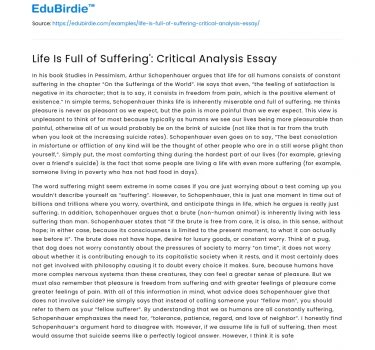Introduction
Life, in its multifaceted complexity, is often described as a journey filled with suffering. This perception is deeply embedded in various cultural, religious, and philosophical narratives, most notably in Buddhism, which identifies suffering, or 'dukkha', as a fundamental characteristic of human existence. The notion that 'life is full of suffering' invites profound introspection into the human condition, encouraging an examination of the sources, manifestations, and potential transcendence of suffering. This essay critically analyzes the pervasive nature of suffering, exploring its roots in psychological, socio-economic, and existential dimensions. By delving into these aspects, the essay aims to unravel the intricate layers of suffering, questioning whether it is indeed an inescapable part of life or if there exists a path to mitigate its impact. Through a balanced discourse, which includes counter-arguments and examples drawn from real-life cases, this essay seeks to offer a nuanced understanding of suffering's role in shaping human experiences.
Psychological Dimensions of Suffering
The psychological perspective on suffering highlights mental and emotional distress as core components. Renowned psychologist Carl Jung posited that "neurosis is always a substitute for legitimate suffering," suggesting that much of human suffering stems from unresolved internal conflicts. Psychological theories often emphasize the role of cognitive and emotional processes in exacerbating suffering. For instance, cognitive-behavioral models highlight how negative thought patterns and maladaptive beliefs can intensify feelings of despair and hopelessness. Real-life cases of individuals overcoming depression and anxiety through cognitive restructuring underscore the impact of mindset on suffering. However, this perspective also acknowledges the role of external factors, such as trauma and chronic stress, in contributing to psychological suffering. While therapy and medication offer pathways to alleviate suffering, critics argue that such approaches may oversimplify the complexity of human emotions, neglecting the broader existential questions that underpin psychological distress.
Save your time!
We can take care of your essay
- Proper editing and formatting
- Free revision, title page, and bibliography
- Flexible prices and money-back guarantee
Transitioning from psychological to socio-economic dimensions, it is crucial to consider how external circumstances shape individual experiences of suffering. The interplay between internal and external factors is evident, as socio-economic conditions often exacerbate psychological distress. Addressing both dimensions is essential in comprehensively understanding and addressing suffering.
Socio-Economic Influences on Suffering
Socio-economic factors significantly contribute to the pervasive nature of suffering. Economic disparity, poverty, and social inequality are critical determinants of suffering, as they create environments where basic needs are unmet, leading to physical and emotional distress. Nobel laureate Amartya Sen's capability approach emphasizes that poverty is more than a lack of income; it is a deprivation of basic freedoms and opportunities. This deprivation manifests as suffering, as individuals are unable to achieve their full potential. Real-life examples, such as the struggles faced by marginalized communities, illustrate how socio-economic constraints perpetuate cycles of suffering. Moreover, systemic issues like racism and discrimination compound these challenges, creating barriers to accessing resources and opportunities. Addressing socio-economic suffering requires systemic change and policy interventions aimed at reducing inequality and promoting social justice. However, critics argue that focusing solely on socio-economic dimensions may overlook the individual's capacity for resilience and agency. Thus, a balanced approach that considers both systemic and personal factors is essential in addressing the multifaceted nature of suffering.
Transitioning to the existential dimensions of suffering, it is important to recognize that while socio-economic factors provide a tangible context for suffering, existential questions delve into the deeper, often intangible, aspects of human experience. This transition invites an exploration of how individuals find meaning and purpose amidst suffering, a theme that resonates across philosophical and spiritual traditions.
Existential Perspectives on Suffering
Existential philosophy offers a profound lens through which to understand suffering, emphasizing the search for meaning in the face of life's inherent uncertainties. Viktor Frankl, a Holocaust survivor and existential psychologist, asserted that "suffering ceases to be suffering at the moment it finds a meaning." This perspective suggests that suffering, while an inevitable part of life, can be transcended through the pursuit of purpose and understanding. Existentialists argue that the awareness of mortality and the quest for authenticity drive individuals to confront their suffering and seek meaning beyond material or superficial pursuits. Real-life narratives of individuals who have found solace and resilience through spiritual practices or creative expressions highlight the transformative potential of existential suffering. However, this perspective faces criticism for its abstract nature, as finding meaning in suffering is deeply personal and may not be feasible for everyone. Nonetheless, existential insights offer valuable guidance for those grappling with the profound questions of existence and suffering.
Conclusion
In conclusion, the assertion that 'life is full of suffering' captures a universal aspect of the human experience, yet it is not an absolute statement devoid of hope or resolution. By examining suffering through psychological, socio-economic, and existential lenses, we gain a multifaceted understanding of its origins and manifestations. While suffering may be an inevitable part of life, it is not insurmountable. Human resilience, coupled with efforts to address systemic inequalities and foster personal meaning, offers pathways to alleviate suffering. Counter-arguments that highlight the complexity and individuality of suffering further enrich this discourse, reminding us that while suffering is ubiquitous, the human spirit possesses the capacity for transformation and growth. Ultimately, the journey through suffering can lead to profound insights and a deeper appreciation of life's intricacies, challenging us to find balance and purpose amidst adversity.






 Stuck on your essay?
Stuck on your essay?

